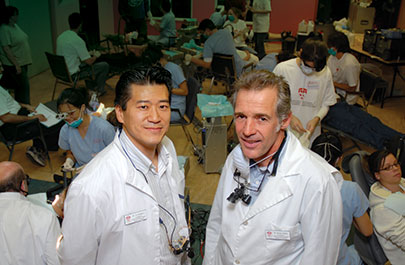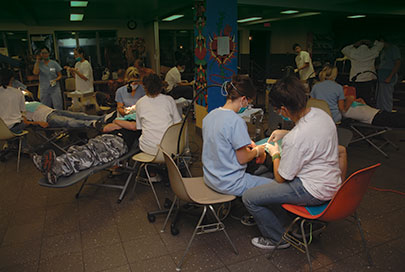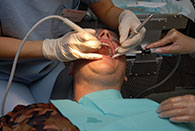Have Dental Drill, Will Travel

Drs. Yu Kwong Li and Bruce Dobby, the co-directors of the Dentistry Community Outreach Program
Rachel Granofsky
Nicholas Vermeersch, a tall, burly young man sporting a camouflage T-shirt and a few tattoos, pumps his arm with excitement. "I'm gonna be frozen," he enthuses, as he reclines into a portable dentist's chair with improbable excitement. "Yeah!"
It's not the sort of reaction one would expect to see from a patient during a trip to the dentist, but then, Vermeersch isn't a typical patient and this isn't a typical dentist's office.
It's a Thursday evening in late September, at Montreal's Dans la rue, located on a downtrodden east-end strip, where the non-profit organization helps street youth get their lives on track. Dans la rue's cafeteria, which feeds between 150 and 200 people each day, has been transformed into an eight-chair mobile dental clinic.
Karen Fung, a fourth-year McGill dentistry student, begins to examine Vermeersch's mouth. Jodi Chu, a dentistry student from second year, works as Fung's assistant. The three have all donned protective goggles. "It's like being in a Star Trek movie, with all the masks and equipment," Vermeersch proclaims.
It's his first dental checkup in a very long time. He is here tonight because it's free and it's taking place in a friendly and familiar environment.
Fung and Cho are two of 16 students at work this evening, all from the Faculty of Dentistry's Community Outreach Program. For Fung and Cho, this is part of their McGill training. They're earning credits for a course formally known as "Dentistry 313: Community Clinics."

Rachel Granofsky
Atypical clientele
Tonight's patients are all in their late teens and early 20s. Clad in T-shirts and torn jeans, they look like scruffier versions of the students in blue dental coats who are treating their teeth — they're all young.
"Sometimes you can see a bit of hesitation and intimidation on the part of the dental students their first time here," says Terri Hill, the resident clinical nurse at Dans la rue. "But once the students start talking with our kids and realize these are just regular people, they're able to see past the tattoos and piercing."
Across the room, the hmmm and brrr of compressors, drills and suction tubes competes with the babble of several ongoing conversations. The room bustles with energy; whenever a hand shoots up, a supervising dentist (all are McGill dentistry professors or clinical instructors and every one is a volunteer) hurries over to offer guidance, answer a question, resolve a conundrum.
Everybody here tonight seems relaxed and in good spirits and the free pizza that's available is only part of the reason why. Dans la rue has been participating in McGill's outreach program for several years, and you won't find any of the stereotypical "fear of the dentist" in this room of youthful patients.
"Dental care is just one of the whole array of problems these kids are facing," says Aki Tchitacov, BA'82, Dans la rue's executive director. "Honestly, they have so much that is difficult and painful in their lives, going to the dentist, especially in an environment like this where they feel comfortable, is not at all frightening."
In fact, says, Hill, these are enthusiastic patients. "The need is great, and the kids appreciate it so much. They even look forward to it.
"They have significant problems," she adds, "from gum disease to rotten or missing teeth — from years of neglect, as well as from malnutrition and abuse. They want to retain what's left, and the clinic affects everything from their overall health to their self-esteem."
"We try to go to places where people have fallen through the social safety net," explains Dr. Bruce Dobby, BSc'76, DDS'81, who, along with Dr. Yu Kwong Li, serves as co-director of the Dentistry Outreach Program for McGill.
Ten years strong

Rachel Granofsky
The Faculty of Dentistry's community outreach clinics first began operating in 1998, the brainchild of former dentistry professor Michael Wiseman, DDS'85. The program now collaborates with over two dozen agencies, including Sun Youth, the Old Brewery Mission, L'Abri en Ville, the Maimonides Geriatric Centre and Famijeune, to probe, polish and protect the teeth of patients who are unlikely or unable to access treatment from conventional dental practices — patients who are impoverished, recent immigrants, elderly or disabled. The clinic offers cleanings, fillings, oral hygiene education, cancer screenings, denture realignments and repairs — all for free.
The initial efforts of Wiseman saw a small group of volunteer dentists treat patients in outreach clinics; soon the dentists were accompanied by McGill students as well. When Wiseman left Montreal, the mantle of responsibility was assumed by two of his long-time volunteer dentists, Dobby and Li, who have guided and expanded the program over the last half-dozen years, in the process transforming it into a credit course.
Today they have a lengthy roster of dentists eager to serve as volunteers, and some, like Dr. Ronnie Fagen, BSc'66, DDS'68 (a clinician who instructs McGill dentistry students on prosthodontics), and adjunct dentistry professor Louise Desnoyers, appear as regularly as the coordinators. Dental assistants Randi Margolis and Zina Bianco, whose day jobs involve working with Li and Dobby in their respective private practices, also lend their expertise for each outing.
Marnie Taylor, the administrative coordinator in the Office of the Dean of Dentistry, schedules the clinics with the partner agencies and keeps track of which students have taken part when. If a clinic is open for business somewhere, Taylor is present, registering patients and booking follow-up appointments for procedures that are too complex for the mobile clinic.
The dental work itself is all performed by third- or fourth-year students, with first- and second-year students acting as their assistants. By graduation, each student will have participated in eight to 10 clinics. "When I went to school, community dentistry was just a lecture," Dobby recalls. "But our students are getting a real slice of society. They're going to graduate from one of the best schools in North America and they'll make good incomes, so if we can impart some sense of social awareness at the same time, they receive a more complete education."
"Our students get a great learning experience," adds Dean of Dentistry James Lund, who himself takes part in outreach clinics regularly. "They learn that you can give very useful dental treatment in a community setting using simple mobile equipment. And they're introduced to patients they would never see in any dental office anywhere in Montreal. You have to go out and find these people in order to help them."
This year will see 19 mobile clinics take place across the island of Montreal, an impressive growth from the six annual clinics that were offered in the early years. The program has come a long way in a decade. "At first we had only two little chairs and the compressor was powering off every five minutes," remembers Li. Last year, there were six chairs, with accompanying equipment. This year, there are eight — a testament both to the growing success of the clinic and to the generosity of the donors who are supporting its work.
The students use basic mobile dentistry units that look like chrome boxes equipped with suction and drilling equipment. Each costs between $6,000 and $8,000. Everything for the clinics is purchased with donations. Between $10,000 and $12,000 is raised every year by the dentistry students themselves through various fundraising activities. Earlier this year, the program benefited from being selected as the Class Action project for 2007 — each year all McGill graduating classes pool together their donations to the University in support of one particularly noteworthy McGill project.
While the program has matured from its early rough-and-ready excursions, it is still very much a hands-on operation for Dobby and Li, who can now boast finely honed roadie skills. At least twice a month they meet in the late afternoon, load a van (parked beneath the McIntyre Medical Sciences Building) with the chairs, dental units and other accoutrements of the trade, drive to their clinic-for-the-night, and set up in time for early evening sittings; at the end, with the help of students, they take it all apart again. "We've learned through experience how to organize everything," says Li, noting that the after-clinic load-out now takes less than an hour.
Experience has also helped them get patients in the seats. "In the beginning, there were times when we had to pull people off the street," he laughs. "But now we have a reputation as offering a viable, useful service."
It's a service that Li and Dobby are anxious to expand.
Opening wider
Currently, when patients need extractions or X-rays, they are referred to one of the outreach program's sessions at McGill's 40-seat student clinic at the Montreal General Hospital, where dentistry students receive the bulk of their practical training.
"Often [the outreach program's] patients need even more complicated things — a root canal or a partial denture, perhaps — that are not in our program's scope," explains Dobby. Soon, though — and again, thanks to donor generosity — patients from the outreach program will have access to more complicated restorative dentistry treatments at the Montreal General clinics.
For patients who meet certain economic and medical criteria, the outreach program will offer a simple deal in exchange for more sophisticated and expensive forms of dental care — pay what you can. "If they need a treatment that costs $400 and can only pay $25, then we'll pick up the other $375," explains Dobby.
"It's a natural evolution," he says. "We want to provide more complex services to the most vulnerable sectors of the community, who, under the current way in which dentistry is funded, have no way to get treatment."
The Faculty of Dentistry as a whole is concerned with the issues that revolve around access to public dental care. In an interview with the McGill Reporter earlier this year, Dean Lund made his feelings on the subject plain. "It is an absolute aberration that teeth are not covered by Medicare while every other part of your body is. What are young families who are struggling just to make ends meet to do?"
But cost isn't the only issue. Trust can also be a barrier.
Bridging the gap
Research done by Dr. Christophe Bedos, an assistant professor of dentistry at McGill, shows that Montreal's indigent population tends to reject the dental system altogether, even though patients on welfare have free access. He also studies how dentists, in general, relate to poor patients.
"These two worlds are in conflict," says Bedos. "Dentists would like to help their [less well off] patients, but they do not understand their behaviours and believe they are not interested in their dental health" — these patients often miss scheduled appointments due to poor time management skills, for instance. "On the other side, welfare recipients think dentists are just money makers, thinking about their own interests. Some dentists manage to overcome these problems, but many do not."
The outreach program is doing what it can to bridge that gap. "You really learn how hard it is for some people to get dental care," says fourth-year student Kerry Anne Flintoff. "We don't do complicated stuff here, but we do make a difference. My patient is a smoker and had stains all over his teeth. But now he looks totally different, he's leaving here happy. But the main thing is that you are helping people who otherwise wouldn't get any dental care."
At the Dans la rue cafeteria, as the autumn evening sky darkens outside, Karen Fung is putting her finishing touches on the now-frozen Vermeersch's teeth. By now, the clinic is winding down; one by one, the air compressors are shut off and the patients check out their shinier teeth.
Across the room, Dominique, a slim, personable young woman, stretches her legs after an examination and cleaning. Her student-dentists are searching for a mirror, so she can assess their work. "I feel really lucky. Dentists are expensive," she says. "And it's good for the students to work on people who don't have enough money to pay."
Dominique also needs a root canal, and could well be one of the first beneficiaries of the outreach program's subsidized care program. "But now they are going to make my teeth even," she says, pointing to her slightly misaligned incisors. She lowers herself back into the chair and smiles; she's feeling good, her teeth are looking great.
For Dominique, life just got a little better.
Patrick McDonagh, a former associate editor of the McGill News alumni magazine, is a Montreal-based freelance writer. Four of Patrick's articles for the News have earned prizes from the Canada Council for the Advancement of Education.


